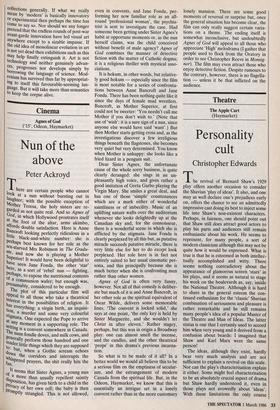Cinema
Agnes of God (15', Odeon, Haymarket)
Nun of the above
Peter Ackroyd
There are certain people who cannot look at a nun without bursting out in laughter; with the possible exception of Mother Teresa, the holy sisters are re- garded as not quite real. And so Agnes of God, in which Hollywood prostrates itself at the foot of the altar, arms akimbo, affords double satisfaction. Here is Anne Bancroft looking perfectly ridiculous in a little black-and-white number: she is perhaps best known for her role as the sex-starved Mrs Robinson in The Gradu- ate, and now she is playing a Mother Superior! It would have been delightful to have seen Jane Fonda, the other 'star' here, as a sort of 'rebel' nun — fighting, Perhaps, to expose the nutritional contents of a communion wafer; but enough was, presumably, considered to be enough. The plot of this particular film will aPpeal to all those who take a theatrical interest in the possibilities of religion. It has everything: a virgin birth, an inquisi- tiO°, a murder and some very colourful stigmata. One expected the Pope to arrive at anY moment in a supporting role. The setting is a convent somewhere in Canada. The nuns fondle doves, and milk cows, and generally perform those hundred and one tender little things which they are supposed tri°: but, when a Gothic scream echoes 'own the corridors and interrupts the Whispered prayers, the shit really hits the fan.
It seems that Sister Agnes, a young nun of a more than usually repellent saintly disposition, has given birth to a child in the Privacy of her own cell; the baby is then Promptly strangled. This is not allowed, even in convents, and Jane Fonda, per- forming her now familiar role as an all- round 'professional woman', the psychia- trist is sent to investigate the case. Had someone been getting under Sister Agnes's habit at opportune moments or, as the nun herself claims, was the child conceived without benefit of male agency? Agnes of God combines the manner of detective fiction with the matter of Catholic dogma; it is a religious thriller with mystical asso- ciations.
It is hokum, in other words, but relative- ly good hokum — especially since the film is most notable for a series of confronta- tions between Anne Bancroft and Jane Fonda. There has been nothing quite like it since the days of female mud wrestlers. Bancroft, as Mother Superior, at first could not be sweeter: 'You needn't call me Mother if you don't wish to.' (Note that use of 'wish': it is a sure sign of a nun, since anyone else would have said `want'.) But then Mother starts getting cross and, as the investigations discover a few irreligious things beneath the flagstones, she becomes very quiet but very determined. You know when Mother is unhappy: she looks like a fried lizard in a penguin suit.
Dear Sister Agnes, the unfortunate cause of the whole sorry business, is quite clearly deranged: she sings in an un- pleasantly high voice, and gives rather a good imitation of Greta Garbo playing the Virgin Mary. She smiles a great deal, and has one of those 'simple' countenances which are a mark either of wonderful saintliness or of imbecility. Music of an uplifting nature wafts over the auditorium whenever she looks delightedly up at the Canadian sky and, for the connoisseur, there is a wonderful scene in which she is afflicted by the stigmata. Jane Fonda is clearly perplexed by all this but, as putative miracle succeeds putative miracle, there is very little else for her to do except look perplexed. Her role here is in fact not entirely suited to her usual cinematic per- sona, and this principally because she is much better when she is confronting men rather than other women.
Agnes of God is often very funny, however. Not all of that comedy is deliber- ate but much of it is and Anne Bancroft, in her other role as the spiritual equivalent of Oscar Wilde, delivers some memorable lines. 'The convent is locked solid,' she says at one point, 'the only key is held by Sister Marguerite, and she wouldn't let Christ in after eleven.' Rather stagey, perhaps, but this was in origin a Broadway play: one can almost smell the incense, and the candles, and the other theatrical `props' in this drama's previous incarna- tion.
So what is to be made of it all? In a better world we would all believe this to be a serious film on the emptiness of secular- ism, and the estrangement of modern Canada from the spiritual life. But, in the Odeon, Haymarket, we know that this is essentially an intrigue set in a lonely convent rather than in the more customary lonely mansion. There are some good moments of reversal or surprise but, once the general situation has become clear, the film can only really suggest certain varia- tions on a theme. The ending itself is somewhat inconclusive, but undoubtedly Agnes of God will appeal to all those who appreciate 'High' melodrama (I gather that people used to flock from the Oratory in order to see Christopher Reeve in Monsig- nor). The film may even attract those who enjoy detective fiction. Despite rumours to the contrary, however, there is no flagella- tion — unless it be that inflicted on the audience.














































 Previous page
Previous page